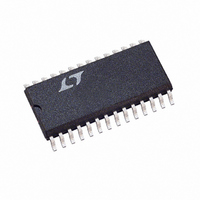LTC1535CSW#PBF Linear Technology, LTC1535CSW#PBF Datasheet - Page 10

LTC1535CSW#PBF
Manufacturer Part Number
LTC1535CSW#PBF
Description
IC TRANSCEIVER RS485 ISO 28SOIC
Manufacturer
Linear Technology
Type
Transceiverr
Specifications of LTC1535CSW#PBF
Number Of Drivers/receivers
1/1
Protocol
RS485
Voltage - Supply
4.5 V ~ 5.5 V
Mounting Type
Surface Mount
Package / Case
28-SOIC (7.5mm Width)
Device Type
Differential
Interface Type
RS422, RS485
No. Of Drivers
1
Supply Voltage Range
4.5V To 7.5V
Driver Case Style
SOIC
No. Of Pins
28
Operating Temperature Range
0°C To +70°C
Svhc
No
Rohs Compliant
Yes
Lead Free Status / RoHS Status
Lead free / RoHS Compliant
Available stocks
Company
Part Number
Manufacturer
Quantity
Price
APPLICATIONS INFORMATION
LTC1535
Isolation Barrier and Sampled Communication
The LTC1535 uses the SW-28 isolated lead frame package
to provide capacitive isolation barrier between the logic
interface and the RS485 driver/receiver pair. The barrier
provides 2500V
the two sides uses the isolation capacitors in a multiplexed
way to communicate full-duplex data across this barrier
(see Figure 20 and Block Diagram). The data is sampled and
encoded before transmitting across the isolation barrier,
which will add sampling jitter and delay to the signals (see
Figures 13 and 14). The sampling jitter is approximately
250ns with a nominal delay of 600ns. At 250kBd rate,
this represents 6.2% total jitter. The nominal DE signal to
the driver output delay is 875ns ±125ns, which is longer
due to the encoding. Communication start-up time is
approximately 1μs to 2μs. A time-out fault will occur if
communication from the isolated side fails. Faults can be
monitored on the RE pin.
The maximum baud rate can be determined by connecting
in self-oscillation mode as shown in Figure 1. In this
confi guration, with SLO = V
set by the internal sample rate. With SLO = 0V, the frequency
is reduced by the slower output rise and fall times.
10
V
10μF
CC
+
1
1
1
4
1
LOGIC COMMON
V
GND
CC
RMS
ST1
of isolation. Communication between
2
3
2
FLOATING RS485 COMMON
CC2
ST2
CTX02-14659
, the oscillation frequency is
420kHz
**
1/2 BAT54C
1/2 BAT54C
2
** COOPER (888) 414-2645
2
GND2
+
Figure 10
11
I
LOAD
10μF
Push-Pull DC/DC Converter
The powered side contains a full-bridge open-loop driver,
optimized for use with a single primary and center-tapped
secondary transformer. Figure 10 shows the DC/DC
converter in a confi guration that can deliver up to 100mA
of current to the isolated side using a Cooper CTX02-14659
transformer.
Because the DC/DC converter is open-loop, care in choosing
low impedance parts is important for good regulation. Care
must also be taken to not exceed the V
maximum voltage of 7.5V when there is very light loading.
The isolated side contains a low voltage detect circuit to
ensure that communication across the barrier will only
occur when there is suffi cient isolated supply voltage.
If the output of the DC/DC converter is overloaded, the
supply voltage will trip the low voltage detection at 4.2V.
For higher voltage stand-off, the Cooper CTX02-14608
transformer may be used.
V
14
CC2
I
1535 F10
EXT
I
VCC2
8
6
4
2
0
0
V
CC
TOTAL LOAD CURRENT, I
= 5.5V
V
V
50
CC
CC2
= 5V
vs I
CC2
V
CC
LOAD
= 4.5V
recommended
100
LOAD
(mA)
1535 F10a
150
1535fb













